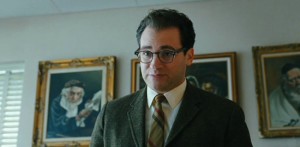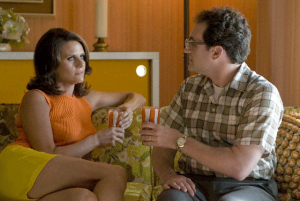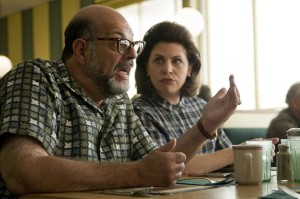A Serious Man
 Is it unfortunate that musical medleys are not appreciated? No, it isn’t, but that’s because it is rare that any artist does anything creative with the notion, instead relying on the droning familiarity and kitsch factor, pandering to the type of crowd that likes to hear songs that they know. That’s what nightclub entertainers tend to specialize in, covering the back catalog of a popular performer, stringing together unwieldy segues to bridge songs that lose all meaning out of the proper context. What you don’t tend to hear is a currently popular band doing a medley of their own music, and that’s what made The Smashing Pumpkins b-side to their hit Zero, a 23 minute bit of randomness called Pastichio Medley, which was a collection of 70 mostly unused riffs from their smash 1995 double album, Mellon Collie and the Infinite Sadness. Pastichio Medley is both irritating and engaging, moving onto the next musical idea before you either take to or get bored with the previous 10-15 seconds of disorganized ideas. Listening to the song is like getting a good idea of what Mellon Collie and the Infinite Sadness is without actually listening to it, a mix of the self-indulgent and the catchy and memorable.
Is it unfortunate that musical medleys are not appreciated? No, it isn’t, but that’s because it is rare that any artist does anything creative with the notion, instead relying on the droning familiarity and kitsch factor, pandering to the type of crowd that likes to hear songs that they know. That’s what nightclub entertainers tend to specialize in, covering the back catalog of a popular performer, stringing together unwieldy segues to bridge songs that lose all meaning out of the proper context. What you don’t tend to hear is a currently popular band doing a medley of their own music, and that’s what made The Smashing Pumpkins b-side to their hit Zero, a 23 minute bit of randomness called Pastichio Medley, which was a collection of 70 mostly unused riffs from their smash 1995 double album, Mellon Collie and the Infinite Sadness. Pastichio Medley is both irritating and engaging, moving onto the next musical idea before you either take to or get bored with the previous 10-15 seconds of disorganized ideas. Listening to the song is like getting a good idea of what Mellon Collie and the Infinite Sadness is without actually listening to it, a mix of the self-indulgent and the catchy and memorable.
 The Coen Brothers’ new film A Serious Man very much follows the Pastichio Medley playbook, throwing together all of the things that both endear and annoy an audience to their distinctive style. There are the shots of sweaty discomfort, with the camera lingering just a beat too long on an annoyed lower level employee/secretary as they judge the main character nodding politely while awkwardly waiting to be seen by the all-powerful boss (The Hudsucker Proxy, Fargo, hell, the scene is in pretty much all their films). There’s the scene that always immediately follows the waiting room sequence in their films, where the main character enters a mysterious room*, foreboding music playing, as the camera slowly tracks until it reaches an enormous desk for what often turns out to be a heavyset man, who is often petty, stupid, and mean, but the main character has to bow to his wishes (Barton Fink, The Man Who Wasn’t There). There’s the intentional lack of dramatic neatness, like a shaggy dog story where there’s no real conclusion, and we aren’t shown what we’ve been led to believe we would (The Big Lebowski, No Country For Old Men). Plot strands have no reason to be tied together in a Coen’s film, and in their best movies, their misdirection isn’t so much in the upcoming surprises, but that they mock the viewer for attempting to think rationally and expect any kind of standard satisfaction.
The Coen Brothers’ new film A Serious Man very much follows the Pastichio Medley playbook, throwing together all of the things that both endear and annoy an audience to their distinctive style. There are the shots of sweaty discomfort, with the camera lingering just a beat too long on an annoyed lower level employee/secretary as they judge the main character nodding politely while awkwardly waiting to be seen by the all-powerful boss (The Hudsucker Proxy, Fargo, hell, the scene is in pretty much all their films). There’s the scene that always immediately follows the waiting room sequence in their films, where the main character enters a mysterious room*, foreboding music playing, as the camera slowly tracks until it reaches an enormous desk for what often turns out to be a heavyset man, who is often petty, stupid, and mean, but the main character has to bow to his wishes (Barton Fink, The Man Who Wasn’t There). There’s the intentional lack of dramatic neatness, like a shaggy dog story where there’s no real conclusion, and we aren’t shown what we’ve been led to believe we would (The Big Lebowski, No Country For Old Men). Plot strands have no reason to be tied together in a Coen’s film, and in their best movies, their misdirection isn’t so much in the upcoming surprises, but that they mock the viewer for attempting to think rationally and expect any kind of standard satisfaction.
You either roll with the off-putting style or you wince at the deliberately ridiculous characterizations and mannered performances. It’s not really a coincidence that their biggest financial success (before No Country For Old Men) Fargo, follows the mainstream pattern of having no loose ends, and ending at a point that would make perfect sense in a standard film.
 A Serious Man works a lot more like Barton Fink in its lack of glamour and polish front and center, except the Coens challenge themselves by having nary a recognizable face to automatically identify with, unless you count Richard Kind**, who spends most of the movie in the bathroom, using a tube to drain his body of relentless puss. Instead of worrying about grand conspiracies, crimes, or murders, A Serious Man focuses on a Jewish suburban mid-western town, circa 1967, specifically a college professor (Michael Stuhlbarg, clearly made up to look like an older Barton Fink), Larry, dealing with his wife’s sudden need to divorce him***, strange bribes from underperforming students, and how this affects his religious faith. Larry is the beleaguered patsy waiting to see a series of rabbis who give him various types of useless advice, and just like us in the audience, we never get an answer to any question, religious or otherwise (there’s more than a hint of Job here). Stuhlbarg is the perfect actor to express The Coen’s need to give us one scene after another featuring frozen poses of discomfort, as Larry’s cumulative lesson seems to be that “doing nothing is not bad,” and you should accept whatever you’re told to do. It’s a similar message to Mike Judge’s Extract, also a movie about middle class frustration and passivity.
A Serious Man works a lot more like Barton Fink in its lack of glamour and polish front and center, except the Coens challenge themselves by having nary a recognizable face to automatically identify with, unless you count Richard Kind**, who spends most of the movie in the bathroom, using a tube to drain his body of relentless puss. Instead of worrying about grand conspiracies, crimes, or murders, A Serious Man focuses on a Jewish suburban mid-western town, circa 1967, specifically a college professor (Michael Stuhlbarg, clearly made up to look like an older Barton Fink), Larry, dealing with his wife’s sudden need to divorce him***, strange bribes from underperforming students, and how this affects his religious faith. Larry is the beleaguered patsy waiting to see a series of rabbis who give him various types of useless advice, and just like us in the audience, we never get an answer to any question, religious or otherwise (there’s more than a hint of Job here). Stuhlbarg is the perfect actor to express The Coen’s need to give us one scene after another featuring frozen poses of discomfort, as Larry’s cumulative lesson seems to be that “doing nothing is not bad,” and you should accept whatever you’re told to do. It’s a similar message to Mike Judge’s Extract, also a movie about middle class frustration and passivity.
 However, the Coen’s style is to make us uneasy, which they manage frequently, especially in the wonderful opening scene, as a Yiddish couple several hundred years in the past deal with the possibility of an apparition entering their sheltered lives. The scene is shot like a combination of a fairy tale and a bar room style Jewish joke, and, as per The Coen’s habits, has absolutely nothing story wise to do with the rest of the movie. The dread that it creates though, is palpable, and while coherent or consistent is no way to describe A Serious Man, the feeling that something unknown is lingering stays with you for days after the movie is over. Will you like the movie? I have no idea if I did and I’m not sure who the audience is for it that would. You certainly can’t knock it for being predictable and it’s so specific in covering a time and place that probably never existed (does anyone believe that a mid-western suburb in the late 1960s would be 99% Jewish, and heavily orthodox at that?), which is probably exactly the way the Coens wanted it. A Serious Man somehow manages to be simultaneously incredibly intimate and autobiographical and yet so unrealistic as to verge on science fiction. I think they’d take that as a compliment.
However, the Coen’s style is to make us uneasy, which they manage frequently, especially in the wonderful opening scene, as a Yiddish couple several hundred years in the past deal with the possibility of an apparition entering their sheltered lives. The scene is shot like a combination of a fairy tale and a bar room style Jewish joke, and, as per The Coen’s habits, has absolutely nothing story wise to do with the rest of the movie. The dread that it creates though, is palpable, and while coherent or consistent is no way to describe A Serious Man, the feeling that something unknown is lingering stays with you for days after the movie is over. Will you like the movie? I have no idea if I did and I’m not sure who the audience is for it that would. You certainly can’t knock it for being predictable and it’s so specific in covering a time and place that probably never existed (does anyone believe that a mid-western suburb in the late 1960s would be 99% Jewish, and heavily orthodox at that?), which is probably exactly the way the Coens wanted it. A Serious Man somehow manages to be simultaneously incredibly intimate and autobiographical and yet so unrealistic as to verge on science fiction. I think they’d take that as a compliment.
* The Coen Brothers traffic so frequently in The Wizard of Oz idea of “The Man Behind the Curtain,” that A Serious Man’s weather complications should be of no surprise.
** I don’t count Adam Arkin, who has been dressed and styled to the point of distraction to look exactly like one of the Coen’s favorite actors, George Clooney. Arkin, doesn’t manage to evoke Clooney at all, the only thing he brings to the table is the droopy face he inherited from his father Alan Arkin.
*** She leaves him for an overbearing, overweight, passive-aggressive lothario, who looks just like the late director of Eating Raoul and Death Race 2000, Paul Bartel, and appears to have absolutely no charm of any kind whatsoever.



